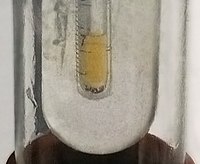
Photo from wikipedia
The concept of high liquid repellency in multi-liquid-phase systems (e.g., aqueous droplets in an oil background) has been applied to areas of biomedical research to realize intrinsic advantages not available… Click to show full abstract
The concept of high liquid repellency in multi-liquid-phase systems (e.g., aqueous droplets in an oil background) has been applied to areas of biomedical research to realize intrinsic advantages not available in single-liquid-phase systems. Such advantages have included minimizing analyte loss, facile manipulation of single-cell samples, elimination of biofouling, and ease of use regarding loading and retrieving of the sample. In this paper, we present generalized design rules for predicting the wettability of solid-liquid-liquid systems (especially for discrimination between exclusive liquid repellency (ELR) and finite liquid repellency) to extend the applications of ELR. We then apply ELR to two model systems with open microfluidic design in cell biology: (1) in situ underoil culture and combinatorial coculture of mammalian cells in order to demonstrate directed single-cell multiencapsulation with minimal waste of samples as compared to stochastic cell seeding and (2) isolation of a pure population of circulating tumor cells, which is required for certain downstream analyses including sequencing and gene expression profiling.
Journal Title: ACS applied materials & interfaces
Year Published: 2018
Link to full text (if available)
Share on Social Media: Sign Up to like & get
recommendations!